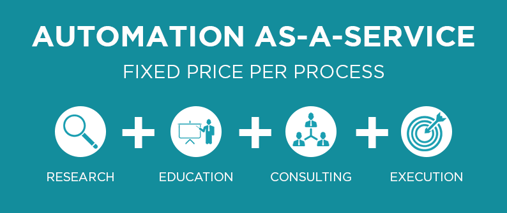In recent weeks there have been a number of thoughtful articles written about the stumbles and disappointments some organisations have experienced with their initial forays into the world of robotic process automation (RPA.)
McKinsey has always been at the forefront of new trends shaping the business world, and a recent blog post¹ by two of its partners, Vik Sohni and Alexander Edlich mentions that some RPA adopters are feeling burned.
EY has also gone public with a similar assessment that 30% - 50% of RPA projects have failed to achieve their aims.
I am humble enough to admit that I do not know everything about the work that has gone on in these organisations, but I find it difficult to draw any reasonable conclusions from these reports as the source of their data and methodology is far from clear.
These kinds of articles are subsequently being cited by some as evidence that RPA is some kind of sham and that those evangelising it are false prophets, when the truth is very different.
I believe any negative sentiment is being latched on to by those wishing to create fear, resist change to existing business models and even generate more consulting revenues.
Mindfields is building its future on RPA (and it is going great thanks!) In fact, we have recently announced a new push to become the “One stop shop of automation with fixed price per process” … but more of that later.
In the case of some large consulting firms, negative sentiment forms a part of wishful thinking … they wouldn’t be unhappy at all if RPA just disappeared and left their business models without disruption.
At Mindfields, where we specialise in automation and have full commitment to the model we have yet to have a client initiative go off track. All of our clients have achieved benefits from their early RPA initiatives.
Deep experience is never peaceful.
This is not to say that it is all plain sailing – of course it isn’t, this is pioneering work in many ways, so some mistakes are made along the way. The crucial thing for us has been having strong risk frameworks in place to mitigate the harm of those mistakes.
This is a new journey for all and expertise will evolve as it progresses, as much as some may like to say “oh well we tried” and discard the idea, RPA (and the benefits it can bring) is not going away.
The planning and implementation of RPA is a balancing act of workloads between humans and machine and we have never had these opportunities before. It will take time, but in my experience it is eminently possible to work together with a client to find perfections in these imperfections.
Mindfields is growing because plenty of organisations seek out an organisation that is embracing RPA, but there is a very big world out there and many will be counting on them to apply their expertise towards helping them to get this right.
It would be short-sighted for any consulting firm to seek to scare off clients from RPA in order to preserve human hours-based consultancy revenue.
The successful players in this industry need to look inward at their own business models and not make the mistake of other sectors in talking down and denying the reality of technology disruption.
They all employ very intelligent humans and need to evolve their offerings. Just as many of us advise organisations to design strategies around agile business models, the industry needs to tackle its own disruption head on.
For all the consultancy presentations that have advised of “Uber threats” in various industries, RPA is effectively the same for consulting, so it is time to practice what we preach.
All things are difficult before they become easy, and a rising tide raises all boats … so we would like to make our methods broadly available. And this is what I was talking about earlier, with my bold statement about becoming the “One stop shop for automation.”

I was delighted to tell The Australian Financial Review about our move to bundle our “secret recipe” for successful RPA implementations into an “Automation as a service” offering, which will be available for a fixed price per process. They have also questioned such ‘negative reports from consulting firm.
As well as reading the article linked above, here is a video explaining this offering, which I hope you will watch, but in case you don’t here’s a list …
We are bundling the following:
- Research - Mindfields was one of the first advisory firms to launch a comprehensive RPA research study. It was part sponsored by ANZ Bank, who were one of the early adopters of RPA and are currently the biggest deployer of a Robotic workforce on a global basis. A digital version of this report is available online and is updated on a regular basis to keep subscribers up to date with the ever evolving RPA landscape. The information is based on our first hand experiences of using and deploying RPA tools. This research report is agnostic to RPA tool or vendors as we do not want to become a quasi marketing engine for RPA tool vendors.
- Consulting - Our subscribers have access to our extensive database of RPA case studies, which lists processes that can potentially be, or already have been automated. This makes selecting processes for automation much easier and faster for the end user. We have also automated our own consulting process, hence making it faster and cost effective for our clients.
- Education - Our clients are empowered to do automation themselves. We have designed various types of training programmes depending on the skill sets of those within either the business or specialist IT teams. Our IP based Education offering is broader than tool specific training. RPA software and tools are evolving very fast, hence, tool specific training becomes obsolete very fast.
- Execution - New users are able to execute automation effectively based on our efficient and innovative methodology and lessons learnt from previous engagements. We are incorporating lean methodologies to re-engineer the process of enabling automation. Our experiences gained from automating more than 400 processes has given us the confidence to automate the process at a faster pace and the ability to quote a fixed price per process.
Our new “Automation as a service” model is unique in the industry and provides organisations with the opportunity to try out RPA at a fixed price per process. By automating our process of providing research, consulting, education and execution, the generational shift towards on-demand services can be embraced within the business.
When a consumer books an Uber they are indifferent whether it is a Kia, a Holden or a Mercedes that shows up (they just want to get to a destination at a price point)… so is the case with process automation. Businesses can now think about the outcomes they are seeking, rather than getting bogged down in the technology specifications.
I would like to thank my team, clients and mentors in the industry for enabling us to get to this point and would welcome any constructive feedback and suggestions.
Topic: Robotic Process Automation, Blog


